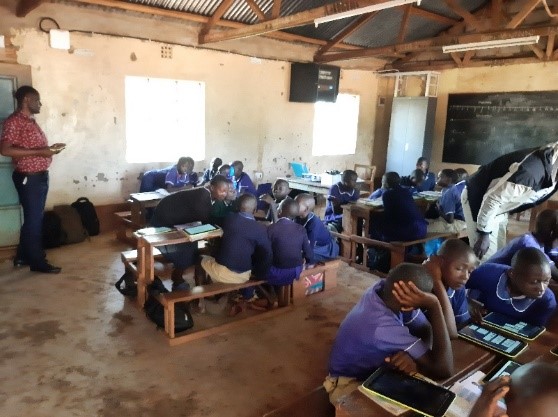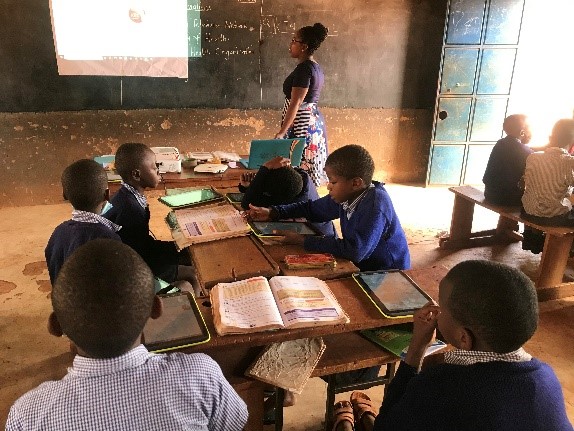The Digischool Project: Connecting Kenya's Schools
In Kenya, providing sustainable Internet access to all schools is a key part of the government’s drive to integrate ICT into education. The government has made a number of national and international commitments to transform the African nation into a knowledge society and knowledge economy, as stipulated by Articles 43 and 46 of the Constitution of Kenya 2010, which enshrine the right of every Kenyan to receive a quality education.
With this in mind, the Digischool project was born as a collaborative initiative between Kenya's Ministry of Education (MoE), Ministry of ICT & Digital Economy, and ICT Authority; UNESCO; and Huawei (under its TECH4ALL digital inclusion and sustainability initiative). The partners combined their strengths and resources to assess schools, identify appropriate technology solutions, support teachers, and develop a sustainable solution that leverages the government’s 9,000-km National Optic Fibre Backbone Infrastructure (NOFBI). Underpinned by the fibre network and Kenya’s Digital Literacy Programme, Phase 1 of the project provided 13 schools (9 primary and 4 secondary) with fast, reliable, and stable Internet connectivity, benefiting 6,000 learners. The project has also provided schools with devices, digital content, and teacher training.
While schools close to the fiber network were directly connected to fibre, more remote schools have been connected using wireless technologies. In these cases, small towers were constructed at the nearest fibre connection point and also at the schools, with Huawei’s leading point-to-point microwave solutions bringing the Internet from one to the other. All 13 schools currently enjoy Wi-Fi speeds of 100 M/bits or more.
-

School children in Kenya working on Internet-connected tablets -

Digischool Phase 1 Findings
Phase 1, which was completed in 2021, has revealed an array of valuable insights, including challenges, best practices, and the implementation process. Led by the MoE and released in August 2023, the Internet Connectivity to Schools report details these insights to:
- Ascertain how Internet connectivity enhances teaching.
- Determine best practices for the scalability and sustainability of Internet connectivity in schools.
- Establish how Internet connectivity strengthens schools’ administrative functions.
I've summarised the key findings below:
- While teachers used the Internet before this project (mostly for admin, sometimes for teaching), low speeds and high costs limited its efficacy.
- A lack of devices can reduce the benefits of the Internet if not all classes have online access at any one time.
- The Internet boosts not just education quality, but also the education environment and the attitudes of learners and teachers.
- As well as the official Kenya Education Cloud, teachers and learners use a variety of online platforms and tools, particularly YouTube and interactive quizzes.
- The Internet creates many unplanned benefits such as inter-school support and student access to international competitions.
- School admin significantly benefits from online access, especially from communicating with parents.
- The savings made from fast and free Internet greatly offset the minor increase in power costs.
- School Internet can also benefit parents and local communities, but this could in turn affect Internet speeds for students.
- Internet providers must also provide Uninterruptible Power Supplies (UPS) or battery backups and enough Wi-Fi Access Points for full school coverage
- Schools must be supported by rapid local technical support.
Download the full Internet Connectivity to Schools report for the full array of insights.

Digischool Phase 2
Phase 2 of the project was announced in March 2023 by the First Lady of the Republic of Kenya Rachel Ruto at International Women’s Day celebrations, which was hosted by the project partners at the Kenya Institute of Special Education (KISE).
The second phase will connect a further 15 schools with aerial fiber, including six special-education schools. As well as providing additional content and activities to support girl students interested in science and technology, the project will provide video conferencing technology for the Kenya Institute of Special Education (KISE) to support students and teachers at special education schools.
For the latest digital inclusion stories and projects, including progress with Digischool Phase 2, subscribe to our TECH4ALL X account.
And subscribe to the blog to keep pace with the latest tech, trends, and ICT industry news and views!
Disclaimer: Any views and/or opinions expressed in this post by individual authors or contributors are their personal views and/or opinions and do not necessarily reflect the views and/or opinions of Huawei Technologies.


Leave a Comment